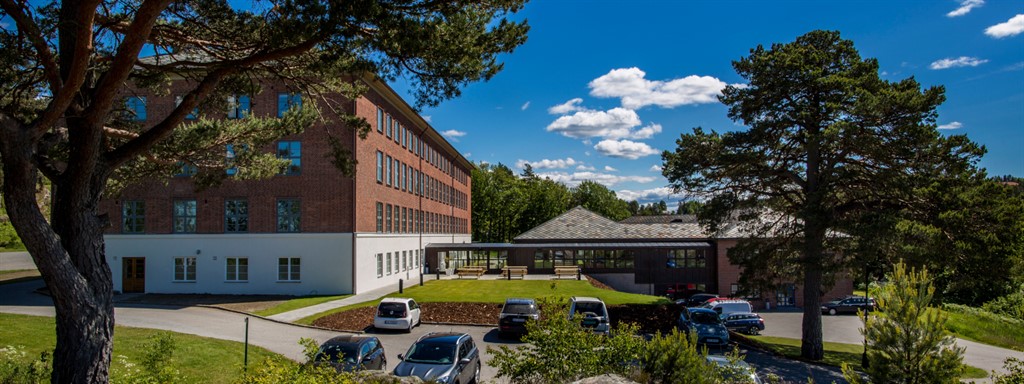The Halden HTO Project has been asked by the Halden HTO Management Board to extend its role in knowledge transfer to the young generation and to contribute to competence building in the nuclear industry. Therefore, in cooperation with the OECD Nuclear Energy Agency (NEA), the Halden HTO Project will organize a Summer School on Small Modular Reactors, 21 – 24 August 2023, in Halden, Norway.
Topics
The topics of the summer school will cover the basics of Small Modular Reactors (SMRs), important principles in the regulation of new advanced reactors, and various designs of SMRs. The focus is on the “HTO view” of SMRs, including the human factors aspects of these new designs. However, it is also an important focus to clarify and discuss the boundaries for human actions in the various SMR designs including the new inherent safe designs and the passive safety features. Which role will humans play in these designs? Thus, this discussion will be introduced by presenting some of the technical designs and how the new operational concepts are proposed, leading to the boundaries for the human role and thus the requirements for human actions.
Venue & target audience
The conference venue is the Fredriksten Hotel in Halden. It will be an in-person event only. In order to emphasize the networking aspect of the event, we will not offer a virtual or hybrid alternative.
The summer school is primarily aimed at young professionals in the beginning of their career and will be informative both for regulators, vendors and utility personnel. However, the summer school may be useful also for more experienced people wanting to know more about SMRs. The lectures will be supported by examples from the Halden HTO experimental program.
Fee and accommodation:
Fee: 5000 NOK is to be paid after registration, further instructions will be sent by email. The fee covers lunches, two joint dinners, coffee breaks and fruit, course materials, associated events and other related costs.
Accommodation: Hotel price Fredriksten hotel: 1495 NOK per person per night, breakfast included. This must be paid for by the participant on departure.
Registration:
Please register by sending an email to ronja.sveen.bye@ife.no. More information regarding payment will be sent to you by email. Please use the same contact information if you have any questions.
Tentative programme
Sunday, August 20, 2023
Download detailed program here
Sunday, August 20, 2023
Sunday, evening of August 20, 2023, Getting acquainted, joint dinner. Fredriksten Hotel, Halden.
Monday, August 21, 2023
- Overview of OECD NEA’s role and functions in nuclear safety, and an overview of the OECD NEA Halden HTO Program
- Introduction to the Halden HTO program, focus on SMRs, multi-unit and automation
- Small Modular Reactors – an overview
- Regulation of advanced reactors in the U.S., “Part 53”
- Panel session: Key takeaways from todays’ sessions: Implications for boundaries for the human role and requirements for human actions
Tuesday, August 22, 2023
- The design and concept of operation of the GE Hitachi SMR
- The design and concept of operation of the NuScale SMR
- Panel session: Key takeaways from todays’ sessions: Implications for boundaries for the human role and requirements for human actions
Wednesday, August 23, 2023
- Microreactors
- Multi-unit challenges and possible solutions – Lab exercises
- Panel session: Key takeaways from todays’ sessions: Implications for boundaries for the human role and requirements for human actions
Thursday, August 24, 2023
- The design and concept of operation of the eVinci micro reactor, Gen IV technologies
- Summary session: Key takeaways from the summer school: Implications for boundaries for the human role and requirements for human actions
Speakers
Robert McDonald
Rob McDonald is a Principal Engineer who has been working at IFE for the last 9 years in the Control Room and Integration Design department. Prior to his time at IFE Rob work as a Shift Engineer at Ringhals Nuclear Power Plant in Sweden for 4 years. Rob worked for Westinghouse on the AP1000 project for 2 years before coming to Sweden.
Prior to Westinghouse Rob worked in the Operations Department at Comanche Peak NPP in Glen Rose Texas. Rob has worked in nuclear power plant operations for over 30 years holding Reactor and Senior Reactor licenses on Westinghouse four-loop PWR design. Rob’s nuclear career started in the US Navy nuclear power program onboard submarines.
Dr. Thomas Anthony Ulrich
Dr. Ulrich is a human factors and reliability research scientist at the Idaho National Laboratory. He has led and participated in several full-scope, full-scale simulator studies using the Human Systems Simulation Laboratory (HSSL) to investigate a range of nuclear control room topics. Dr. Ulrich possesses expertise in human performance assessment methodology. He is an expert in nuclear process control simulation and interface prototyping development.
Dr. Ulrich’s active research includes dynamic human reliability analysis methodology and digital and automated HMI software development for existing and advanced reactor nuclear power plant operations. He is the codeveloper of the Rancor microworld simulator and holds a copyright for “RANCOR Microworld Simulation Environment for Nuclear Process Control,” assertion extension granted on 9/27/18, for a period of ten (10) years, under BEA Attorney Docket No. CW-18-08. He actively develops the HUNTER INL software, which supports dynamic human reliability analysis via simulating virtual operators for nuclear and electric grid operations.
Dr. Ulrich currently leads a research project using the HSSL to evaluate commercial flexible power operation and generation concepts of operations for coupling offsite hydrogen production to existing light water reactors. Most recently Dr. Ulrich started supporting a first of a kind research project to develop an advanced reactor remote concept of operations leveraging multiple digital twins located at both the reactor site and as a support tool for operators at a remote operations center.
Dr. Claire Blackett
Dr. Claire Blackett is a Principal Research Scientist in the department of Humans and Automation at the Institute for Energy Technology (IFE) in Halden, Norway. Claire’s research interests include human-automation interaction, human performance and reliability in technologically advanced environments, and the ethical use of artificial intelligence in society.
Claire has a background in sociology, computer science and root cause analysis, with a PhD in human and organizational factors in accident analysis from University College Dublin, Ireland. Claire has worked as a human factors specialist in the nuclear industry for over 15 years and has led the HTO activity on Human Performance in Multi Unit Operations since 2020.
Ryan Flamand
Ryan Flamand, Plant Operations Supervisor is responsible for development of the NuScale simulator. A remote version of the simulator has been installed at five separate universities for educational, research, and outreach purposes.
Flamand is an experienced operator whose career began in 1993 in the U.S. Navy (six years) as a Nuclear Electronics Technician. He has worked in various operations positions at Palisades Nuclear Plant including holding both a reactor operator and senior reactor operator operating license. During his time at Palisades, he held positions of on shift Control Room Supervisor, Operations Outage Control Center, and Supervisor of a rapid maintenance response team, and qualified Shift Manager.
Flamand joined NuScale in 2014 and has worked on updating NuScale licensed operator staffing requirements, integrated system validation, and various projects in support of the NuScale human factors program. He moved to the simulator development group in 2019.
Flamand holds a bachelor’s degree in Nuclear Engineering Technology from Thomas Edison State College.
Dr. David Desaulniers
Dr. David Desaulniers is a senior-level scientist at the United States Nuclear Regulatory Commission (NRC) with over 34 years of experience in the nuclear industry. For the past 15 years, he has served as NRC’s Senior Technical Advisor for Human Factors and Human Performance Evaluation, providing expert technical advice on emerging technical and policy issues concerning human factors and human performance in nuclear safety.
He obtained his doctorate from Rice University, in Houston Texas, where he specialized in Engineering Psychology. Through the development of guidance, standards, and regulations, his work has addressed a wide range of technical and policy issues where there is a nexus between the design and operation of nuclear power plants, human and organizational performance, and the protection of public health and safety.
He has held leadership positions within the Institute of Electrical and Electronics Engineers’ Nuclear Power Engineering Committee, the American Nuclear Society’s (ANS) Large Light-Water Reactor Consensus Committee, and the Nuclear Energy Agency’s Working Group on Human and Organisational Factors. For his achievements in human and organizational factors to advance nuclear safety and innovation, Dr. Desaulniers is a recipient of NRC’s Distinguished Service Award and ANS’s Don Miller Award.
Karen Priestman
Karen started her career in 1990 at Ontario Hydro, the precursor to Ontario Power Generation (OPG) which will be building the first SMR in North America. She has worked in a wide variety of roles, in consultancies, design organizations, manufacturers, and, for 10 years, as an independent contractor, before joining GEH SMR Technologies Canada Ltd in 2022.
Karen’s career has been a mix of systems engineering and human factors engineering (HFE), largely in high-hazard industries, including defense, rail, oil and gas, and nuclear. Civil nuclear has been her focus for the past 18 years, with 15 of those spent living and working in the UK. She spent 6 years supporting the Hitachi-GE and Horizon UK ABWR new build project, leading the HFE during the Generic Design Assessment for 4 years, and acting as HFE Manager for the EPC contract and then the Architect Engineer for the site-specific phase until the project was canceled.
Currently, Karen is the HFE Technical Lead for the BWRX-300 SMR design-build project at GEH. Karen has a Bachelor of Applied Science in Systems Design Engineering with a Human Factors minor from the University of Waterloo in Ontario, Canada. She is an Ontario-licensed Professional Engineer, a Chartered Fellow of the UK Chartered Institute of Ergonomics and Human Factors, and a member of the International Council On Systems Engineering.
Dr. Joseph E. Oncken
Dr. Joe Oncken is a postdoctoral research associate at INL in the Instrumentation, Controls, and Data Science department. His research interests include advanced control methods such as model predictive control, surrogate modeling for complex systems, and remote monitoring and operation systems.
At INL, he leads research into remote operation systems for remotely deployed microreactors, including the application of digital twins for system security and resilience. In addition, he also pursues research into predictive control development and deployment for the autonomous operation microreactors. Dr. Oncken holds a Ph.D. in mechanical engineering from Michigan Technological University, and a B.S. in mechanical engineering from the University of North Dakota.
Véronique Rouyer
Ms Véronique Rouyer is Head of the Division of Nuclear Safety Technology and Regulation of the Nuclear Energy Agency (NEA), since August 2019, coordinating the development of effective and efficient regulation and oversight of nuclear installations, and helping to maintain and advance the scientific and technological knowledge base.
Prior to joining the NEA, Ms Rouyer was the Safety Research Director at the Institut de radioprotection et de Sûreté Nucléaire (IRSN). From 2009 to 2016, she gained extensive experience in the development and coordination of scientific programme plans as Deputy Director for the scientific projects, strategy partnerships division after a long carrier supporting criticality safety activities.
Dr. Ron Boring
Dr. Ron Boring is a Distinguished Human Factors Scientist and Department Manager at Idaho National Laboratory (INL). He has led control room modernization and human risk efforts for a variety of national and international partners.
He was the founder of the Human Systems Simulation Laboratory at INL and led development of prototyping tools such as the Advanced Nuclear Interface Modeling Environment (ANIME) and human factors evaluation methods like the Guideline for Operational Nuclear Usability and Knowledge Elicitation (GONUKE) to support control room development at U.S. utilities. He has developed the Human Unimodel for Nuclear Technology to Enhance Reliability (HUNTER) method, which is used extensively for risk modeling. Dr. Boring has a Ph.D. in Cognitive Science from Carleton University.
He was a Fulbright Academic Scholar to the University of Heidelberg, Germany, and currently holds the honorary title of Fellow of the Human Factors and Ergonomics Society. In 2021, he was the recipient of the Don Miller Lifetime Achievement Award from the American Nuclear Society. In 2022, he was recipient of the Arnold M. Small and Betty M. Sanders President’s Distinguished Service Award from HFES. He has published over 300 research articles in a wide variety of human reliability, human factors, and human-computer interaction forums.
Matthew J. Kravec
Westinghouse Electric was founded by George Westinghouse in Pittsburgh Pennsylvania in 1886. Westinghouse has revolutionized energy distribution by commercializing alternating current technology. Today, his namesake company continues to shape tomorrow’s energy.
While daily work entails providing nuclear energy technologies, products and services to utilities around the world, the mission is focused on a much broader goal; using the power of intellect, collaboration and innovation to build on the legacy of our founder, and to create a cleaner, safer and sustainable carbon-free future for generations to follow. Matt will provide an overview of the eVinci™ microreactor’s innovative design which is a combination of space reactor technologies and 50+ years of commercial nuclear systems design, engineering and innovation. The key benefits of the eVinci™ microreactor are attributed to its solid core and advanced heat pipes. The heat pipes enable passive core heat extraction, allowing autonomous operation and inherent load following capabilities. These advanced technologies together make the eVinci™ microreactor a pseudo “solid-state” reactor with minimal moving parts.
Matthew graduated from Pennsylvania State University in 2011 with concurrent bachelor’s degrees in Mechanical Engineering and Nuclear Engineering. He also received a master’s degree in Material Science and Engineering from the University of Pittsburgh in 2015. He earned his Professional Engineer’s License in the State of Pennsylvania in 2018.
He is currently employed by Westinghouse Electric as the lead reactor system engineer for the eVinciTM microreactor, responsible for progress of the reactor core and system design. Matt has over 10 years of experience in designing advanced reactors for the Naval Nuclear Laboratory, a contractor for the U.S. Navy where he was trained in in Six Sigma earning a Green Belt.



